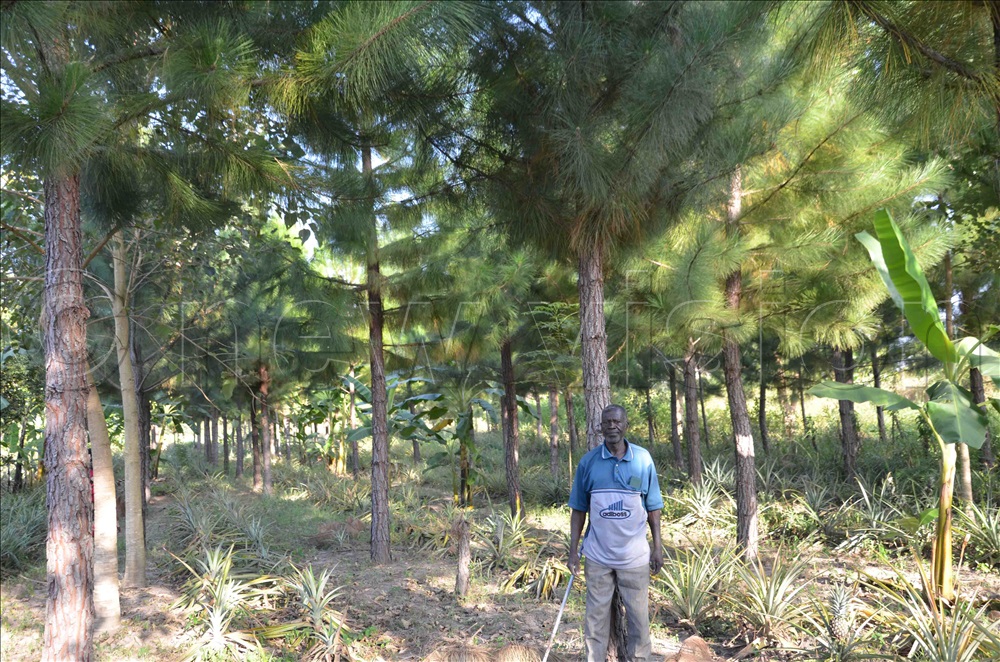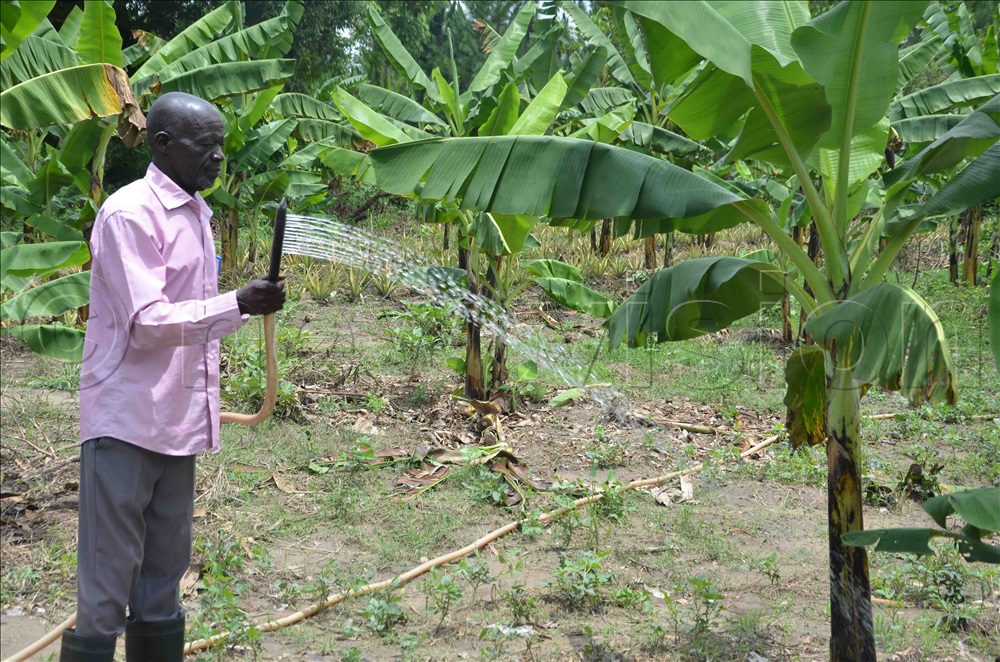By Patrick Okino
Before he retired from civil service and jumped into farming, Paskweli Otto had little interest in farming until President Yoweri Museveni inspired him through his four-acre model farming message.
In addition, Otto picked a lot of inspiring information from Harvest Money book published by Vision Group on different enterprises; poultry, fish farming, beekeeping, goat rearing, pineapple growing, tree planting and bananas growing, among others.
He zeroed in on three enterprises; pineapple, tree plantation and bananas growing to keep him busy, supplement his pension and generate income to set up more developmental projects.
Otto is the chief executive officer of Owiny Agro-Innovation Centre farm, located in Angic village, Ayabi sub-county, Kwania district.

Before he went into farming, he was working at the National Water and Sewerage Corporation as a quality control officer in charge of the Lira area.
Otto says he read the story of Immaculate Akullo, one of the Best Farmers in the 2020 competition that motivated him further.
“I got motivated since I am also exposed at a managerial level,” Otto said, adding that the President’s gospel on a four-acre model encouraged him further.
Starting the journey
After retiring in 2017, with some savings, Otto procured 120 pineapple suckers from Amach market in Lira district at sh200 each, prepared the field and planted.
Otto says after planting, he weeded three times and after eight months, the enterprise started fruiting.
He harvested and sold each at sh3,000 earning sh360,000. This was a step towards a positive direction and he started realising that there is money in farming.
“I then went back to the same person and bought 500 suckers. Since then, I have been making progress until 2021, when I added 2,000 more suckers,” he says.

Market
Though Otto doesn’t have reliable markets, he is still using the available local consumers and those making local wines.
He sells each at sh3,500 and in a month he sells 2,000 pineapples translating to sh7m.
The demand for the fruits and suckers is high. He says he sells both products in Agwata trading centre, Dokolo town and Lira city.
Reaping from suckers
Besides reaping from the fruits, Otto also earns from suckers. In a month, he says he sells between 120 and 150 at the cost of sh500, which earns him sh80,000.
A stem of pineapple produces between 18 to 20 suckers within five months, according to Otto.
“After removing the fruits, you still harvest suckers for five months,” he says.
Mulching
Otto says the Harvest Money book has helped him to maintain soil fertility by mulching, application of organic manure and introduce small scale irrigation on the farm.
He says mulching helps to keep the soil moisturised, soft and fertile, while irrigation systems supply water in the farm during the dry season.
To ease the process (mulching), Otto involves part-time workers to assist in collection of grass.
Expenditures
Otto has four-part time workers and in a month he spends sh400,000 on their salary, fertiliser takes sh60,000 and transportation to the market using bodaboda sh6,000.
He says sometimes he doesn’t meet the cost of labour and transportation, especially for clients who come to the farm.
Challenges
Otto says droughts, financial incapacitation and lack of reliable markets are some of the challenges the farm has.
The farmer says although he has installed small scale irrigation systems to supply water on the farm established in 2018, operating it is not easy.
“I want to improve on irrigation by installing a big water tank because the one I have now is small and it is not easy to pump the water locally,” he said.
For the market, Otto says since the farm is expanding, he is looking for reliable markets both nationally and internationally.
Family involvement
Otto says the family helps in planting, clearing the farm, weeding, mulching and pumping water to irrigate the farm during dry spells.
He says the family participates fully in all the activities on the farm, though there are also part-time workers.
“Sometimes there is a lot of work and the only four workers I have cannot accomplish it, so the family comes in and we do it together,” Otto adds.
Keeping afloat
Otto says his 12-year-old grandchild, James Ogole, is doing a lot on the farm, although he is still young and requires proper guidance.
“The boy helps in planting, pumping water and mulching,” he says.
“I am grooming Ogole to learn more about pineapple growing, irrigation and banana planting so that if by coincidence I am not around, the boy can carry on,” Otto adds.
He says one of his sons, Isaac, who is pursuing motor vehicle mechanics at Human Technical Development Institute in Lira city, also participated in the farm progress.
Best practice
For the farm to keep on growing and enterprises expanding, Otto says he is mulching, irrigating and maintaining constant local clients.
He says because of consistency, proper planting, weeding twice a month, sales of both quality fruits and suckers made the farm grow and it is still growing.
Records
According to Otto, he keeps sales records, costs involved in transportation, planting, weeding, expenditure and harvesting. To keep the contacts and details of each and every person who visits the farm, the farmer has a visitors’ book.
Mistakes
Otto says at one time he procured 300 suckers and planted them, but later it rained heavily when they had not grown and were badly affected.
The second mistake he experienced was when he planted the crops during the dry season, the suckers took a lot of time to produce fruits and in the process they rotted.
“To mitigate that, I just started mulching and irrigating to escape incurring losses,” Otto says.
Bio-security
Otto notes that he has good neighbours, who benefit a lot from the farm. They are his security guards, although he has started fencing the farm.
“Security is not a big problem because I associate well with my neighbours and they are my security officers,” he adds.
Achievements
Farming helps me to educate my two children pursuing certification in forestry and agriculture in two institutions. It also helps me financially to support my school, Kachung Junior and Primary School in Agwata. I have also expanded tree planting.
Plan
“I want to plant as many trees as possible and to be the largest producer of pineapple in Uganda because I have enough land and I will be producing my own suckers,” he says.
Otto adds that he is also planning for value addition by procuring machines to make juice and wine within two years.
“I also want to start apiary projects, poultry, piggery and fish farming before the centre becomes a fully equipped training place for students pursuing agricultural courses,” he adds.
Tree plantation
Otto says before introducing pineapple growing as his main enterprise, he got encouraged by his colleague, CP Ocen in 2003 to start tree planting projects as a long-term plan to protect environment and go commercial.
Otto visited a person with disabilities at Agwata in Dokolo and found he had planted one acre of pines and they were looking good.
He got motivated and bought 3,600 seedlings for planting at sh50, translating into sh180,000.
Expenditure
Otto says he paid sh25,000 as application fee, used sh750,000 for clearing the field, sh1.1m for seedlings, sh250,000 for marking and planting, sh750,000 for weeding and sh500,000 for thinning and pruning.
He says by that time he was still working with the National Water and Sewerage Corporation.
Benefits
Otto says when the plantation reached maturity in 2015, he harvested and used the money to roof his school, Kachung Junior Nursery and Primary School and bought more land for the institution.
“I harvested and earned sh40m,” Otto says, adding that when he deducted the cost of cutting, transportation and other expenses it came down to sh30m.
He currently has 15,000 pine trees on seven hectares and hoping to plant 3,000 more trees.
Hope for expansion
Otto says his main targets is to plant trees to protect the environment, generate income, expand the school and also boost pineapple growing.
He says it has three hectares of land and he is planning to add 5,000 pineapples, which can sustain him for a long time as a long-term investment.
Community members speak out
Joyce Okello, one of the neighbors said the farm offers employment opportunities to the community, offer access to the products and sometimes they visit the farm to learn how to grow pineapples and bananas.
Okello said the community benefits from the farm, especially during the dry season.
“There is a constant production of tomatoes, cabbage and onions,” she said.
“Otto also trained community members on how to plant and mulch during the dry season,” Okello adds.
Non-governmental organisations and Kwania district local government leaders also take learning trips to the farm.
Otto says he has trained six people in the neighborhood and they have started implementing what they have learnt.
“There are people who I offered free suckers to and they have already planted,” he adds.
Ogema says the little information and experience he acquired from the farm is enough for him to begin farming as a business because Otto is earning daily.
Francis Obonyo, a former headteacher, says when he retired from the service, he had nothing to do, but Otto advised him to start farming.
“I started in 2018 with matooke and as I talk now I have 1,000 stems and have started inter-cropping it with coffee,” he says. Obonyo adds that he has also introduced pineapple, with Otto supplying the suckers.
“My vision is to see that I expand and be a model farmer,” he adds.
Matooke plantation
Although the crop is mainly grown in western and central Uganda, Otto has also started growing it on a small scale to supplement tree plantation and pineapple farming.
On his farm, measuring five hectares, with a tree plantation, Otto has three varieties of matooke, East African highland banana, dessert banana and apple banana.
Otto started growing matooke in 2019 after seeing positive outcomes in pineapple.
The farmer says he bought 50 suckers from Luwero at sh1,000 each, which translated into sh50,000 and right now it has multiplied to 500 stems.
Otto sells the matooke to the local clients as fresh produce for home consumption.
He says he spends sh150,000 for weeding in a month, digging holes, adding that he uses sh20,000 for transplanting and sh10,000 for pruning.
Otto sells 100 suckers at sh1,000 each in a month and 50 bunches at sh12,000 each. This pushes him to sh600,000 per month.
Plan for matooke
Otto says he wanted to expand and start making wines, increase the production and be the best matooke farmer in northern Uganda.





